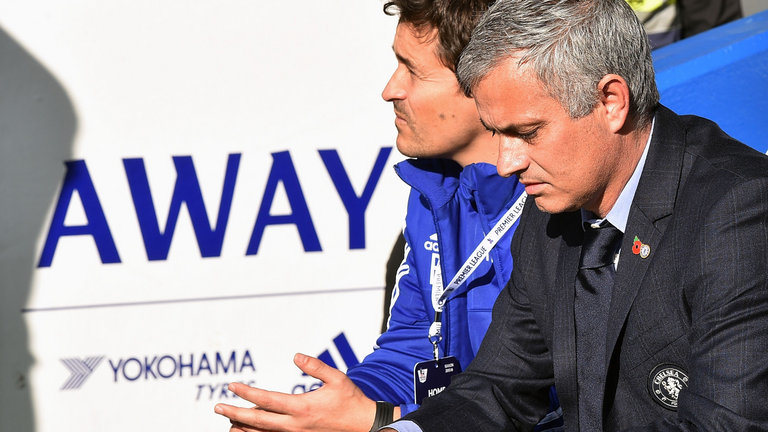
Following
the news that Jose Mourinho has left Chelsea for the second time, Adam Bate
looks at how the most successful manager of his generation looked distinctly
uncomfortable when faced with failure.
It might seem absurd to talk of failure. Jose Mourinho's Chelsea were
champions of England last season. As recently as May, the open-top bus was
making its way down the King's Road and all the talk was of a dynasty.
Mourinho had a new four-year contract and appeared in the mood to embark on
an era of dominance. Only sustained success was missing from his CV. It
seemed inevitable.
Seven months later and he's gone. And the stench of failure emanates from
Stamford Bridge. How could it be judged as anything else? Arsene Wenger
might be the specialist in it, but his Arsenal team haven't finished outside
the top four in 19 attempts. Even David Moyes left Manchester United in
seventh. Chelsea are sixteenth. It's the most inept defence of the Premier
League title ever seen.
For the fifth job in a row, he had succeeded in delivering the league in his
second full season in charge. It was hugely impressive. And yet, curiously
predictable. Mourinho's ability to steel a side for the challenge of a title
campaign remains second to none. This intensity, the ability to coax more
from the very best, has marked him out as a true great. What would happen
next was the question.
By Mourinho's own criteria, his exit represents failure. Longevity was what
he sought. "In modern football with everything that surrounds it, it's very
difficult for that to happen," he acknowledged in the summer. "That's what I
want. I didn't say it at Inter because I didn't want to. I didn't stay at
Real because I didn't want to. I want to stay here. I want to develop this
team."
That was the purpose of this move from the outset. It was this that marked
Chelsea out as a "different project" free from the pressure of Real Madrid
and the need for "immediate success". For much of his first season in
charge, he was repetitive in insisting that the team was not yet ready to
win. His goals were long term and he was outwardly determined to frame his
reign in those terms.
In his opening 'Happy One' press conference, Mourinho had exuded calm.
Instead it's ended in chaos. The stability he'd advocated has been
conspicuous by its absence. Re-examining that initial press briefing upon
his return to the club in the summer of 2013, that's the mantra that most
obviously jars with what we've all witnessed these past few months. Spot the
recurring word…
Mourinho spoke of the "much better conditions this time to succeed and have
what this club wants: which is stability". He added: "Of course we look for
stability. The only way to build success again is with stability. We are
pulling in the same direction, the owner, the board, me, and the players
will be happy if we can give them that stability. It's what I need in this
moment of my career."
However, it's that very stability that Mourinho has undermined. "Every
manager has weaknesses. I'm trying to improve them," he said that day two
years ago. But the change has not come. Referees, opposing managers, doctors
and pundits. There was always a new target for his ire and, in the case of
Wenger and Rafa Benitez, even a few old faces needlessly occupying his
thoughts.
Ultimately, the feeling persists that Mourinho's great strength - his
relentless success - proved his undoing. A manager more accustomed to the
vagaries of form and fortune might have been prepared to wait it out rather
than rail against the situation so aggressively. Instead, in his handling of
John Terry, Nemanja Matic, Eden Hazard and others, Mourinho appeared frantic
in his search for a solution.
In the end, Roman Abramovich decided - as is his wont - that the most
obvious answer was for the manager to leave regardless of the expense. And
with Mourinho's legacy project brought to an ignominious end, it's difficult
to envisage where his career goes from here. Perhaps the experience will
bring the realisation that there is no escaping his true nature.
"I had always this mentality. I always love adventure," he told reporters in
that opening address, evoking comparisons with Vasco da Gama and his
country's famous explorers of yesteryear. "Like Portuguese ones in the past,
I was always a bit of a navigator. I wanted the experience. Now it's up to
me to show I deserve to be here for a long time."
This was indeed the chance to change his story. Mourinho reinvented as a
more placid character eager to show Sir Bobby Charlton and those at
Manchester United that they'd misjudged him in regarding him too combustible
for Old Trafford. Instead, the implosion was more astonishing than even
Mourinho's fiercest critics could have imagined.
 top
top top
top Following
the news that Jose Mourinho has left Chelsea for the second time, Adam Bate
looks at how the most successful manager of his generation looked distinctly
uncomfortable when faced with failure.
Following
the news that Jose Mourinho has left Chelsea for the second time, Adam Bate
looks at how the most successful manager of his generation looked distinctly
uncomfortable when faced with failure.